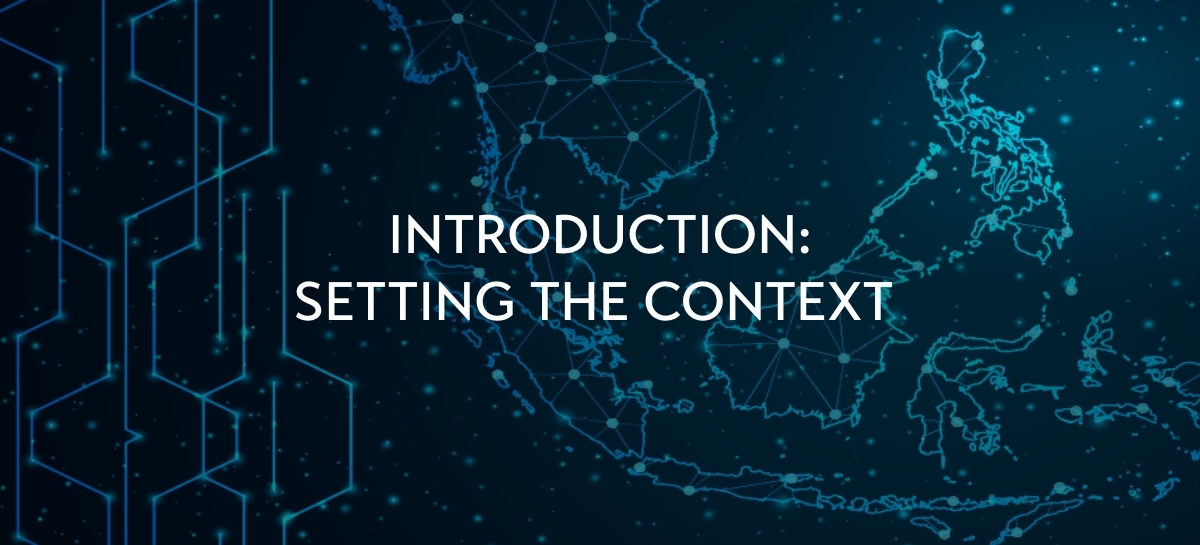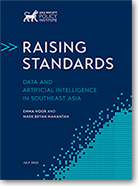Introduction
Data is foundational to the expansion of knowledge, industry, and international ties. In the digital age, a data-driven economy and data-driven policies can contribute to greater prosperity; more responsive governance; and an informed, robust society.
The World Bank estimates that over the past 15 years, the digital economy—powered by e-commerce platforms and cross-border data flows—grew two-and-a-half times faster than global gross domestic product (GDP). Today, countries are training their sights on a Fourth Industrial Revolution that will merge the physical, digital, and biological worlds through technologies such as artificial intelligence (AI) and processes such as big data analytics.
But data is also an instrument of power, influence, and dominance. In the past, data collection in colonial outposts such as in Southeast Asia formed the basis for empire-building and expansion. Census surveys, sociological observations, and cartography exercises by colonial administrators and merchants alike framed the identities of native communities through stereotypical lenses which, when asserted and reasserted as truth, lay the justification for conquest. The digital parallels of some of these practices as they are playing out in today’s world are stark: geo-tagging, biometric surveillance, algorithmic black boxes, as well as the abstraction, extraction, and commercialization of personal data.
While there is awareness of these risks in Southeast Asia, countries’ data-driven policies, along with their corresponding legal and regulatory frameworks, are heavily driven by a digital transformation agenda mirroring the priorities outlined above: to grow the economy, improve public service, and enhance the quality of life for citizens.
This motivation is evident at the national level, as the country chapters in this publication elaborate, but also collectively at the regional level within the Association of Southeast Asian Nations (ASEAN) as blueprints such as the Masterplan on ASEAN Connectivity and the ASEAN Digital Masterplan demonstrate. Additionally, countries commit to ensuring a viable regulatory ecosystem for the digital economy through their participation in bilateral or regional economic arrangements like the Digital Economy Partnership Agreement (DEPA), the Regional Comprehensive Economic Partnership (RCEP), and the Comprehensive and Progressive Agreement for Trans-Pacific Partnership (CPTPP).
Rethinking the digital economy
The consideration of data and its life cycle, from creation to destruction, as well as all the policies that support it, are therefore packaged almost entirely in terms of the digital economy. Even when social well-being is accounted for in discussions on data protection and ethical AI, economic advancement remains the underlying premise and overarching goal. This results in a few blind spots.
Why optimize?
First, the amassing of data coupled with trained, automated, intelligent processes to make sense of all that data is treated as an inevitability to be welcomed so long as ethical and regulatory safeguards are in place. Keywords such as bias, transparency, accountability, explainability, and responsible AI reflect this utilitarian approach to data-driven technologies. But to what end? This is the central question absent in many national discussions.
Official documents touch on this by acknowledging the challenges of access and representation among unserved or underserved communities that have little-to-no internet connectivity and that are therefore unable to fully participate in the digital economy. However, advancing the digital economy and improving public administration are simply a means to an end. The ultimate objective of utilizing data-driven technologies should be the florescence rather than the exploitation of dignity, at the individual level, and the restoration of social justice rather than the exacerbation of existing inequities, at the community level.
For refugees, migrants, or differently-abled communities, this could simply mean using data-driven technologies for education that might otherwise not be available. For minority communities, it could mean weighing community- against individual-based approaches to privacy, since consent is impossible to obtain for big data processing. Paradoxically, for indigenous communities, it could mean relying on data-driven technologies to protect a traditional way of life with minimal dependence on digital data.
For many nations, recentering the focus of data collection and algorithmic application to dignity rather than optimization will require confronting uncomfortable realities in society in order to correct them through technology. These include bias, at best, and bigotry, at worst, with various gradients of discrimination, racism, and xenophobia in between.
Another way to think about the function of data-driven technologies is for it to enable rather than reduce human agency in the transition towards digitalization. For example, while public services may work better on desktop, optimizing them for mobile devices would not only improve user experience but also allow many more to access government facilities online more quickly, frequently, and affordably on their phones (assuming internet access).1
Peace and security
Second, the shared public-private sector focus on the digital economy and public services delivery in data-driven technologies has resulted in very little public exchange about the application of data and ethical AI in other areas, notably peace and security. For example, although the management and protection of personal data during peacekeeping operations bears particular import for personnel-contributing countries like Indonesia, Malaysia, Thailand, and Viet Nam, there is no specific discussion of it in any of the official documents we surveyed. And while national security and defense apparatuses are urged to incorporate AI into law enforcement and military activities, there are few publicly available guidance documents on how it should be done ethically.
More encouragingly, however, even though none of the five countries analyzed is party to the Convention on Certain Conventional Weapons (Viet Nam is a signatory), all have either participated as an observer to UN meetings on lethal autonomous weapons systems, delivered a position statement on the matter, or associated themselves with statements by ASEAN and/or the Non-Aligned Movement. Still, these discussions have not widely permeated domestic policy deliberations, despite countries’ purchase or development of their own unmanned systems for aerial, ground, and maritime defense.
Reframing perspectives
Third, the conventional framing of data and technologies like AI that Southeast Asian countries have adopted also means that the analytical structures to understand and govern them have been borrowed or imported from elsewhere and adapted for domestic application. This is not necessarily a bad thing. However, it would be better if states contributed standards rooted in their respective developmental, socio-political, and ethical perspectives.
Southeast Asia is a significant market in the digital landscape. The region was the “most hooked” to the internet in 2020, with the number of new users reaching almost 10 percent. Globally, it ranks third behind China and South Asia in total number of internet users. Southeast Asian consumers are also becoming “mobile-first”, with 887 million mobile connections. This means that 132 percent of the region’s total population are wired to digital technologies.2
Setting Southeast Asian standards
As our country chapters explain, neither Southeast Asian governments nor industry players—tech unicorns, notwithstanding—are yet adequately, let alone proportionately, represented in international normative or standards-setting bodies. This is due, in large part, to a lack of expertise and resources, compounded by competing priorities in government. However, so long as the region remains a marketplace and a rule-follower rather than a rule-shaper or even rule-maker, the data-driven technologies it will rely on and the governance frameworks underpinning those will not be its own. For instance, the International Organization for Standardization (ISO) has not elected a principal officer from Southeast Asia since Singapore’s Liew Mun Leong served as president in 1997-1998.3
A 2020 report by the Global Partnership on AI and the Future Society mapped 214 initiatives related to AI ethics, governance, and social good in 38 countries and regions. Of that figure, 58 percent originated from Europe and North America.4 This discrepancy is replicated in snapshots of market capture in other areas. Worldwide and in Southeast Asia, US tech companies have a commanding lead in search engines, social media platforms, cloud-hosting services, data centers, operating systems, and submarine cables. Chinese companies—relatively new entrants to the digital tech scene—trail behind, increasingly carving a niche in e-commerce and mobile payments.
This concentration of power and influence in the hands of very few players is already shaping the contours of increasingly data-centric reality for Southeast Asia. Without regional nations framing their own contextually-relevant normative or technical standards on data and AI, there is a risk that data-driven technologies designed and applied abroad could be ill-suited for local application, given the distinct social composition of each of these countries. Even domestically produced platforms and systems modeled after existing ones developed and trained elsewhere could result in unintended consequences.
Additionally, if US-China technological decoupling intensifies, the costs of adapting to technical and other standards concluded without national or regional input could be much higher for smaller Southeast Asian states compelled to choose between different governance models. With data transmitting internationally through space (satellite navigation systems), cyberspace (networks, hardware, and software applications), and under the sea (submarine cables), and with Western and Chinese firms dominating all these domains, Southeast Asian countries could inadvertently find themselves further entangled in great power competition on multiple fronts.
For all these reasons, Southeast Asia—beginning with the five countries surveyed in this project—should broaden its outlook on data and related technologies such as AI beyond the digital economy. Governance is, after all, more than prospering the populace.
The region’s determination of its digital future begins with a recognition that it should proactively shape that path in its own image, in equal partnership with willing partner governments abroad as well as with industry players at home and elsewhere. The next few decades of Southeast Asia’s data-driven environment should incorporate a long, holistic, and clear-eyed deliberation of technology. It should also draw multidisciplinary ideas from Jakarta to Johannesburg, Kuala Lumpur to Kisumu, Singapore to São Paulo, Bangkok to Bengaluru, and Ho Chi Minh City to Hong Kong.
By first taking a step back to assess the data-driven landscape in Southeast Asia and then by raising questions about what is missing from mainstream discourse, we offer some principled and concrete suggestions for the way ahead in our policy playbook. We hope to prompt reflection on how Southeast Asia can raise the standard(s) for data and ethical AI, and in the process, redefine inclusive development for the region.
Endnotes
1 Stakeholder consultation.
2 Kristie Neo, “Southeast Asia: Digital Life Intensified,” We Are Social, March 8, 2021, https://wearesocial.com/sg/blog/2021/03/southeast-asia-digital-life-intensified/.
3 “Principal Officers,” International Organization for Standardization, accessed May 30, 2022, https://www.iso.org/principal-officers.html.
4 Areas for Future Action in the Responsible AI Ecosystem (Boston: The Future Society, 2020), https://thefuturesociety.org/wp-content/uploads/2021/02/Areas-for-Future-Action-in-the-Responsible-AI-Ecosystem.pdf.


